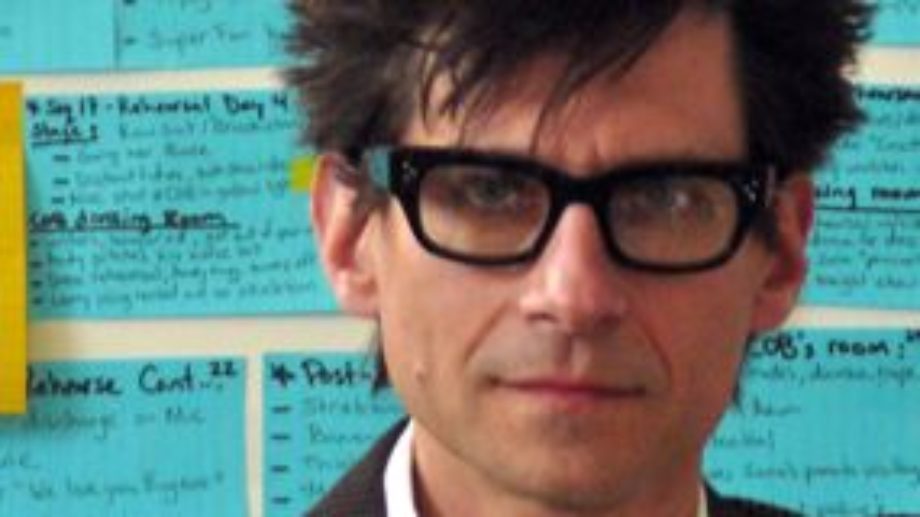
FilmLinc.com: Can you tell us a bit about the origins Conan O'Brien Can't Stop? When did the idea emerge? How many hours of footage did you shoot?
Rodman Flender: Less than 48 hours after he taped his final Tonight Show, Conan mentioned that he wanted to do a series of live concerts. He jammed with an all-star band of guest musicians on his last Tonight Show and had so much fun doing that, he wanted to keep going. And live stages were the only venues where he was legally allowed to perform at that time. As soon as I heard about this concert idea, I knew I wanted to be there and capture it on film. I didn't know what was going to happen and neither did he at that time. And that sense of improvisation is exactly what I wanted to capture in the documentary. I had no agenda, I hand no pre-conceived way that I wanted to depict him in any way, I just wanted to capture whatever he was going to do as he was doing it. And I wound up shooting 149 hours of it.
FilmLinc.com: Following up on that. In the film we see Conan O'Brien at a low moment of his career, trying to use comedy to deal with it and overcome it. Can you talk about gaining the trust you needed so that you could shoot such candid material?
Rodman Flender: Seeing how a comedian uses his comedy to work through a difficult time was also a major motivator for making the documentary. It was all part of the process that I wanted to capture: the nuts and bolts of how a show like this is mounted so quickly, as well as the personal and emotional journey that Conan would experience while he mounted that show. I told Conan all of this right up front when I pitched him the idea of the film. I was completely up front with my intentions so there would be no surprises. And he was fine with that; he had no interest in a puff piece being made about him anyway. Once my intentions were clear and he accepted them, he allowed me the intimate access you see in the film. I wasn't hiding anything.
FilmLinc.com: For decades, documentarians have talked about the fact that once there's a camera on in a room, it changes the dynamic. That is, being a 'fly on the wall' is impossible because its impossible for a documentary crew to really be invisible. In the case of Conan O'Brien, you have someone who is very comfortable in front of the camera. How do you feel that all of this affected your film?
Rodman Flender: Yes, Conan is used to cameras being around him and microphones on him. And it helped immeasurably that I was a one-man crew for most of the shooting. Even when I got some help from an additional cameraperson in a few of the cities, there was never any additional crew. So very quickly me and my camera just became, I hope, part of the wallpaper. That would have been a lot more difficult with a larger crew, boom microphones, camera lights, etc. Being a one-person crew is extremely difficult, challenging — there's a lot of anxiety about being the only one responsible for capturing the action. I also suffered back problems from supporting the equipment all the time. It would have been helpful to have the additional support of a0 crew, but I never would have obtained the intimacy you see in the film. It would have been much more difficult to disappear.
FilmLinc.com: In the movie, we see Conan O'Brien talking about his own perfectionism. Its a trait that we expect from comedians, but I wonder about the impact of that on a film crew. How did that impact your own process, if at all? Were there things that you weren't allowed to shoot or scenes that you had to cut after the fact because they depict moments in the show that didn't work or were fraught with tension or challenges?
Rodman Flender: The challenges of the show are what interested me. Remember that I wanted to capture the process, not the final product. A film about the final product would have been a “live in concert” performance film. What was happening back stage was of more interest to me than what was happening on stage. I don't think many people outside of show business realize just how difficult comedy is. It's almost impossible to do well, and I wanted to show that.
FilmLinc.com: Finally, at the end of the day, the film is a fun road movie offering insights that Conan's fans might never otherwise gain. Was this a fun movie to make? Can you elaborate on the experience of being a part of this project and Conan O'Brien's tour?
Rodman Flender: It was an amazing opportunity to tag along on this tour and capture Conan's wide range of experiences. But my own fun was limited because, while everyone else in the room could laugh at Conan's jokes, I was trying to keep focus and maintain a good shot. I was adjusting sound levels. While Conan and his team hung out in his dressing room, I tried to find a spot to get everyone in the frame while keeping myself out the mirrors. My fun is now, seeing the film with an audience, hearing people laugh and argue and discuss the complex questions that you've brought up.
Conan O'Brien Can't Stop opens today at the Elinor Bunin Munroe Film Center (144 W. 65th St). Tickets are available online now or at the Film Center box office.



